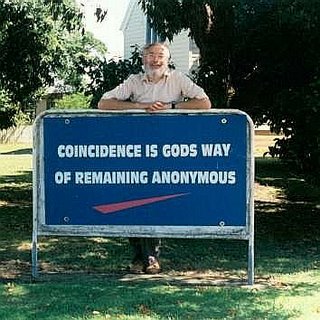Coincidence and Similitude, the Case for 'is'
"Now it is such a bizarrely improbable coincidence that anything so mind-bog-gglingly useful could have evolved purely by chance that some thinkers have chosen to see it as the final and clinching proof of the non-existence of God.
The argument goes something like this: `I refuse to prove that I exist,' says God, `for proof denies faith, and without faith I am nothing.'
`But,' says Man, `The Babel fish is a dead giveaway, isn't it? It could not have evolved by chance. It proves you exist, and so therefore, by your own arguments, you don't. QED.'
`Oh dear,' says God, `I hadn't thought of that,' and promptly vanished in a puff of logic.
`Oh, that was easy,' says Man, and for an encore goes on to prove that black is white and gets himself killed on the next zebra crossing.”
- Douglas Adams (British comic, Writer, author of "Hitchhiker's Guide to the Galaxy" 1952-2001)
5 tenets of 'is'
Basic syntax of 'is'
The Broken Circle Analogy
Yesterday, I proposed that there was one, and only one, belief collection that was all encompassing and comprehensive. (I would similarly extend the argument to make the case for a singular faith collection, ethic collection, in fact 'everything and anything' collection). Our selection of beliefs from this all-encompassing menu of beliefs is based largely on personal perspectives. Our selections can be, and often are, inherited, mere happenstance of birth place, time or origin. Because of these choices, we find them in conflict with beliefs we choose not to choose, in which case we then have the choice of changing another's choice of belief, changing our own, or letting be what is...the 'live and let live' approach to existence; the way of the peaceful warrior, the TOLERANCE approach that I argued in favour of earlier.
This three-way choice is driven largely by whether or not we place our particular personal belief structures at or near the threshold of our level(1) existence (that is, the moral, principled, ethical level of BAT). If the conflict, often arising in the political, religious or ethnic realms, is near enough to the threshold to be perceived as threatening, not to one's safety so much as to one's morality, then the turbulent separation phase exists, the phase of chaos between two apparently otherwise calm, but independent, states. Witness the unending litany of religious and political wars over the course of humanity's existence. What was originally a fight for mere physical survival, the survival of the fittest, has evolved into a fight for moral cleanliness and holiness. While survival of the fittest still exists in what we euphemistically dismiss as 'third-world countries', (choosing in large part to ignore the similar blight in the heart of our own cities and backyards), the tendency of debate, led by political and church leaders and mass-marketed by the focus of media coverage now tends towards the philosophical and political.
The only accomplishment is that yet another state of chaos is introduced into the system. Not only do Catholics fight with Protestants, Democrats with Republicans, rich with poor, Mexicans with Americans, but hungry and homeless with the 'haves' of the world. The solution can't be so simple as to apply Robin Hood thinking and take from the rich to give to the poor, thus making it 'equal for all', for in any system that is complete (and every system, by its mere existence or non-existence must be complete), there must be 'one of each'. Each is unique, redundancy is not only unnecessary but impossible. For every Donald Trump, there must be a baby about to die of AIDS in Africa. For every martyr to the Islam faith, there must be a victim of the martyrdom, for without it, there would be no martyr. For every Christ who dies on a cross, there must be a Christian sinner for whose sins he suffered. Or at least, the possibility of the existence of....
For a system to exist, it can only exist in the complete state, even if a large chunk of its completeness is neither known about nor currently understood. ("Nature abhors a vacuum", "fools rush in where angels fear to tread"). It's absence exists to fill any current void created, not necessarily by reality, but merely by ignorance of it's presence. The fact that we 'think' of something as missing doesn't mean it actually is missing. The missing link isn't missing, it simply hasn't been found yet. Tenet 5(c) of the principles of 'is' states that the existence of anything creates not only its own clone, but it's own opposite, it's own reverse (mirror) and all else that it isn't, even if only by the inference of exclusion.
Now I'm arguing against myself, it seems. I just finished saying redundancy is not only unnecessary but impossible. What might seem like hair-splitting here is in fact critically important. It is the necessary characteristic that allows any entity to 'give birth to itself'; in other words exist in a replicated form. That was what made Henry Ford and MacDonald's hamburgers so rich and famous, yet not a single one of their products is identical in every aspect. They were consumed by different people at different times in different places, prices varied, in fact the list of variances far exceeds the list of similarities. The cloned version of opposite of tenet 5(c) addresses the 'chicken-and-egg' paradox, for how can you have a clone of something that 'is' not yet?
Coincidence is not what dictionaries imply it is. It is a word that is usually associated with the unexpected, but something is unexpected only if you choose not to expect it. Take a discrete moment in time. Make it very small just so it doesn't gather a lot of complicating 'detail dust' in the form of chaotic crossover data (threshold ambiguity). Let's arbitrarily choose the first billionth af a billionth of a second after the Big Bang was purported to have occured (assuming it was an instantaneous happening, not spread over any time dimension whatsoever). Absolutely everything that existed during that time slice was coincidental. Maybe no single observer 'saw' it all happen at the one time, and the fragments that he observed were so obtusely unrelated that he was overcome with the apparent coincidence of it all, but it was merely a selective observation of some of all. This is precisely the same as selecting some beliefs from the entirety of all beliefs and then wondering how a 20-year-old could consider it the highest calling to fly an airplane into a building. Simply because he chose a different selection or subset of beliefs shouldn't be cause for consternation, misunderstanding or surprise.
Will it happen again? Homeland security seems to be predicting that it will, and the way the American population is acquiescing in funding ludicrously extravagant expenditures and are progressing to continue with another physical, killing field confrontation if so provoked all seem to indicate that it will. I can say with certainty and guarantee that it will never happen again. The World Trade Centre buildings in New York City will never again be hit by airplanes on September 11, 2001. I'm not being facetious in saying that. We continually make the mistake of preparing for a future that will not occur, by pretending that the past will replicate itself when there is not a single case to demonstrate that it ever has ("those who don't learn from history are doomed to repeat it"). Has it ever occured to anyone that, if those are indeed wise words, why do we continue to 'repeat it' anyway? We must be an awfully stupid race of beings. The answer, of course, is that we're not repeating, not even replicating it. We're generating faulty coincidental connection between subsequent events (with a time dimension), and then mistakenly viewing them as similar, just like the Big Bang observer. Furthermore, chaos theory can show mathematically, if you need a proof of that sort, that it never will.
Trend analysis sure. But even trivial prediction polls always add the caveat "accurate to within a range of chaos unpredictability (threshold resistance, in 'is' terminology) 19 times out of 20". In Canada, for political polls, for a long time it was referred to as the 'Flora factor', as the result of a grossly mispredicted leadership election result for the Liberal party back in the 60's. They never identify which will be the 20th time, so, of course, any and all of them could be, and therefore are the 20th occurence. Even with chaos theory, long-term predictions are much more reliable than short-term ones; but current state never occurs in the long-term, it only exists in the 'less than short-term' state.
Life insurance companies can develop elaborate, and seemingly-accurate tables showing the average life expectancy of a white, light-smoking mother of three who drank grape juice twice a day during her teen years, but they have no way of knowing if you'll just drop dead today. Cars used to be built with bench-like front seats that the driver could adjust forward and backward if he wasn't average in height, but the non-average passenger with extra-long legs would get bruised in the process until separate, customizable bucket seats were introduced for the passenger as well. There obviously is some value in gambling around the edges, but it is the source of all extravagant 'government programs of waste'. Their gambles never pay off. Just like in Vegas. They, and business, go through alternating cycles of expansion, centralization, re-organization....looking for the holy grail of "rightness". It doesn't exist for a moment.
Think about that statement......"for a moment". Move that billionth of a billionth of a second after the big bang to right now...the 'is' moment. I made a case in an earlier blog that the present doesn't exist as a measure of elapsed time, but only as a non-existent separator between past time and NOT-past time (true of all 'is' separators), filling in the gap of the broken circle [see blog reference at beginning of this blog]. The 'wider you make the band of 'is', the more turbulence you allow into the non-existing void of the present, for you are sucking past memories and activities into time space where they don't belong, and you are pulling future thoughts and actions that haven't occured yet into the same time space. Conflict only happens in the present. It is the time threshold between the past and future. The shorter you can make it, the less turbulent it will be. It 'is' the point in time where inner PEACE meets outer PEACE, where future plan meets past practice, where past practice meets future engagement. If you and I had the capacity to observe everything, real and ineffable and all things in between, in completeness, and do it all in an instant so small as it had no time dimension, there would be no such thing as similar, and everything would be coincidental, expected and predictable.
All the time, it''s right there in plain view. It simply needs to be understood, accepted and applied. Perhaps the word 'simply' is too complex a word to use in this context. It is the counter-intuitiveness of examining any system that is the missing link. The overwhelming tendency is to consider one aspect (or point of view) as being the 'convincing' one. An open-minded person is the one who listens to others before 'making up his mind', perhaps even allowing his views to be swayed or influenced by what he considers to be a stronger or more valid argument. But no matter how open-minded a decision-maker is, no matter how much influence or responsibility a leader might have, no decision will be optimized unless it simultaneaously addresses and meets both extremes of every issue addressed or alluded to by the decision being considered. That is seldom if ever done.
There was a technique in vogue back in the 60's and 70's I believe it was, called Transactional Analysis. It talked about win-lose and win-win scenarios, assuming that a win-win scenario was always the 'best' solution. That may be why the technique fell out of favour. It fell into the category of "the theory works, but the practice fails. It doesn't take into account human nature". Well, that's part of what it didn't take into account. It didn't take into account everything that it didn't take into account. It is the same reasoning why the various creative modellings for conflict resolutions steeped in confrontational strategies, or collaborative strategies, or averaging strategies, or best-offer strategies, or any of the others seldom make it past the pilot project stage, and then funding is cut off, because it's not the one-size-fits-all fix-it machine. 'is' is. And within 'is', BAT is.


"I've learned it's hard to argue with someone when they're right." - Age 38
PEACE












Your endquote is curious.
I've noticed that people are just as hard to argue with when they're wrong; maybe more so, because people who are wrong don't welcome discussion; it might change their point of view.
People who are right usually got that way by endless exploration and discussion. People who are wrong just made up their minds.
Posted by David Newland |
8:00 a.m.
David Newland |
8:00 a.m.
Is that actually a picture of you, Rick?
Posted by My Daily Struggles |
10:01 a.m.
My Daily Struggles |
10:01 a.m.
Dave: I can't help but read a level of editorializing into your comment about my end-quote, implying that I'm declaring myself "right" by quoting it there, and essentially daring anyone to challenge me on my thinking.
I've been adding "I've learned..." quotes to the last half-dozen entries or so, and am drawing them from a book titled: "Live and Learn and Pass It On", subtitled "People ages 5 to 95 share what they've discovered about life, love, and other good stuff."
I find it interesting that my first, gut-level reaction to your comment was that you were "calling me out" for presenting myself as being "right" and stating that it was tough to argue with that, when in fact you said nothing of the sort, and nor did I!
The only point I would find interesting to discuss in your comment is the sense of "wrongness". My position would be that even a person who might be "wrong" by your (or someone else's) standard, is "right" by their own. The exception would of course be if they were intentionally putting forth a wrong position in such environments as brainstorming, devil's advocacy, etc.
Of course, my purpose for selecting that particular quote was to show the irony that people who feel they're "right" by only considering one point of view are "right" in toto, in view of the argument I made in the second last paragraph about open-mindedness and good leadership skills.
Gary: The picture is that of my "alter ego"!!!
Posted by Evydense |
10:19 a.m.
Evydense |
10:19 a.m.
Post a Comment